EMTH6013 Spring 2019 Report: Analysis of Emerging Management Themes
VerifiedAdded on 2023/04/07
|20
|4060
|361
Report
AI Summary
This report provides an overview of emerging themes within the oil and gas industry, particularly in the African context. It is divided into two sections: Section A identifies four key themes: societal changes, emerging work environments, emerging technologies, and emerging industries and markets. Section B delves into these themes, offering practical examples and discussing their implications, challenges, and opportunities. The report emphasizes the importance of adapting to societal shifts, managing a diverse workforce, embracing technological advancements like automation and AI, and navigating evolving market dynamics. Recommendations are provided to help the oil and gas industry remain competitive, including strategies for workforce management, technology adoption, and market adaptation. The report references various studies and articles to support its analysis, covering topics such as automation, robotics, drone technology, and the integration of big data analytics to enhance operational efficiency and safety. It further analyzes the industry's strengths, weaknesses, opportunities, and threats (SWOT), highlighting the need for strategic responses to ensure sustained growth and success.
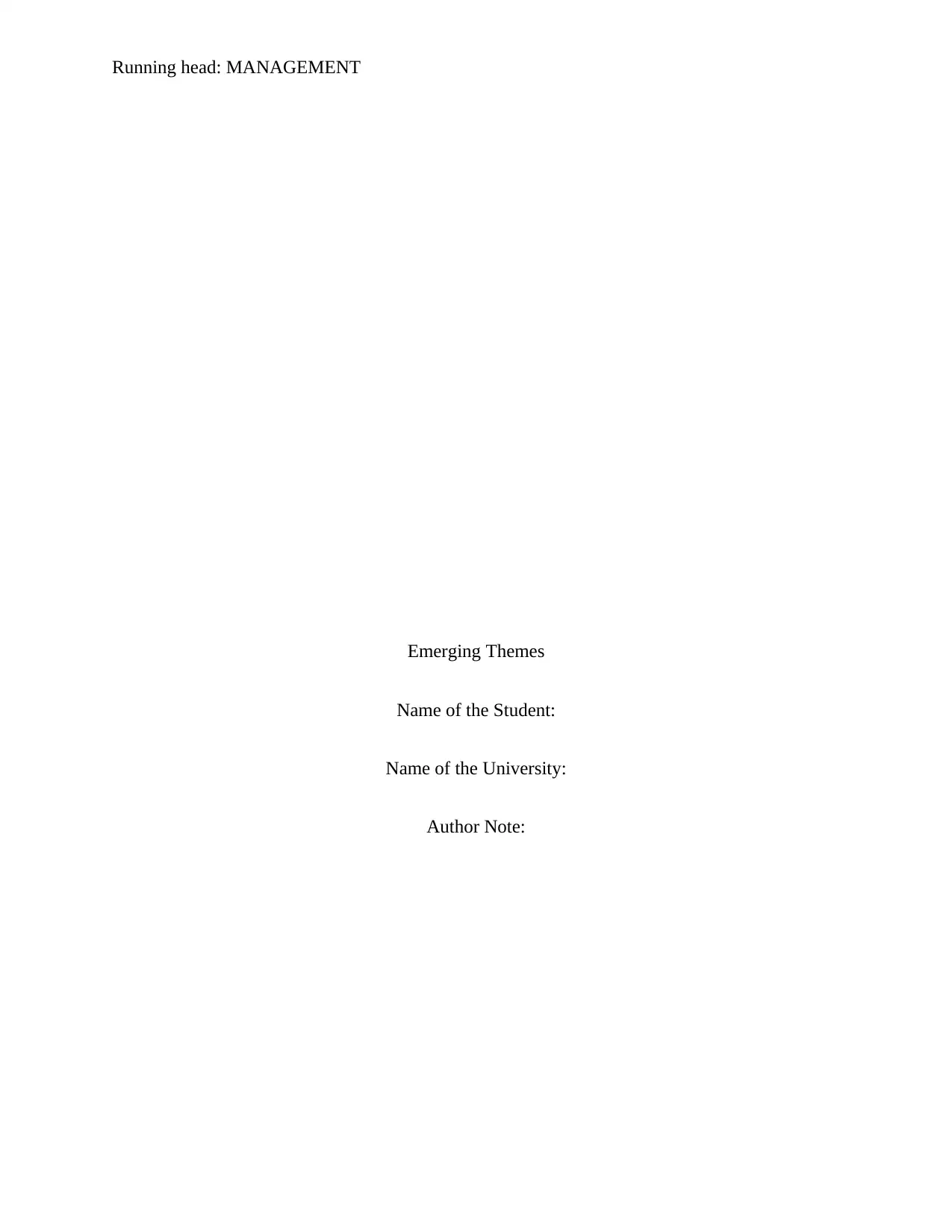
Running head: MANAGEMENT
Emerging Themes
Name of the Student:
Name of the University:
Author Note:
Emerging Themes
Name of the Student:
Name of the University:
Author Note:
Paraphrase This Document
Need a fresh take? Get an instant paraphrase of this document with our AI Paraphraser
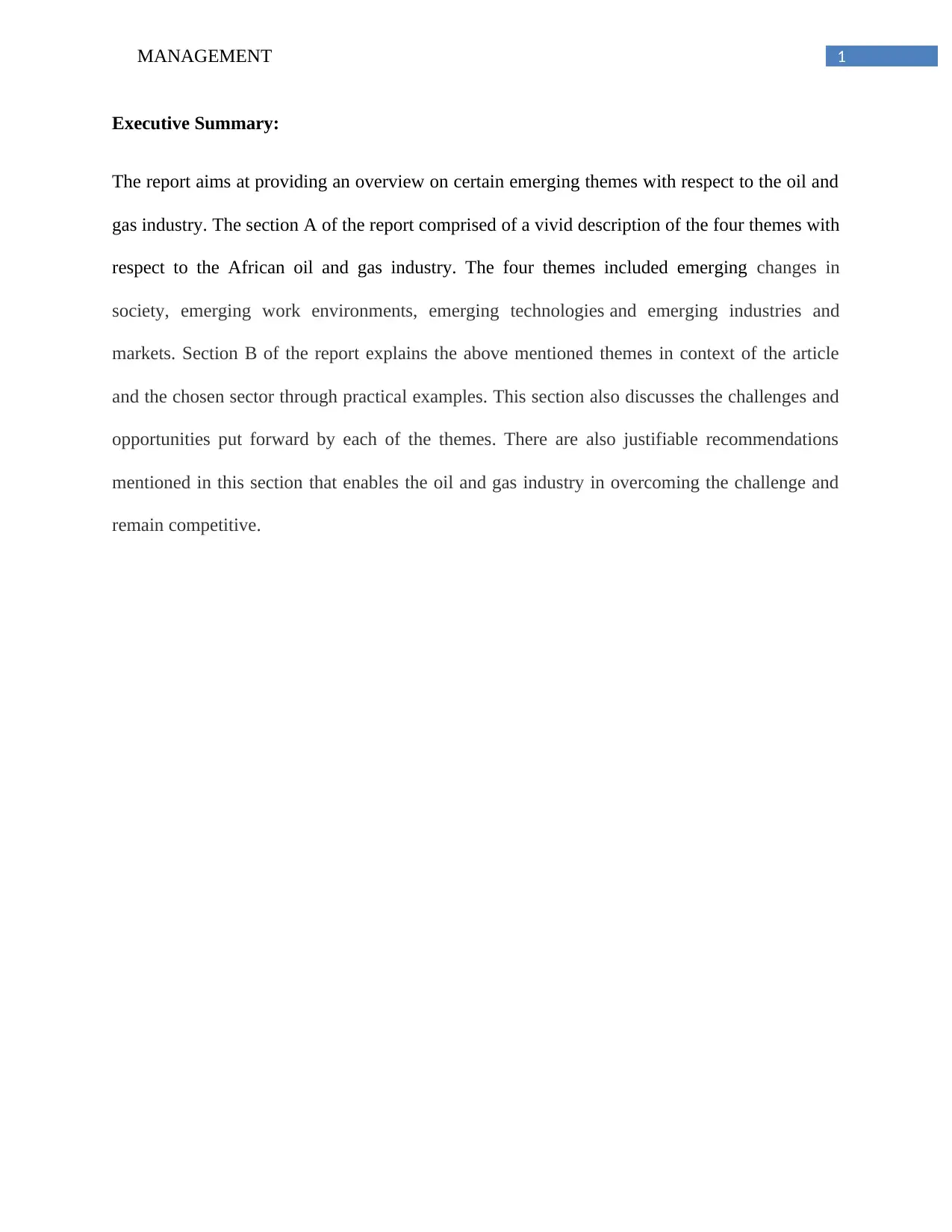
1MANAGEMENT
Executive Summary:
The report aims at providing an overview on certain emerging themes with respect to the oil and
gas industry. The section A of the report comprised of a vivid description of the four themes with
respect to the African oil and gas industry. The four themes included emerging changes in
society, emerging work environments, emerging technologies and emerging industries and
markets. Section B of the report explains the above mentioned themes in context of the article
and the chosen sector through practical examples. This section also discusses the challenges and
opportunities put forward by each of the themes. There are also justifiable recommendations
mentioned in this section that enables the oil and gas industry in overcoming the challenge and
remain competitive.
Executive Summary:
The report aims at providing an overview on certain emerging themes with respect to the oil and
gas industry. The section A of the report comprised of a vivid description of the four themes with
respect to the African oil and gas industry. The four themes included emerging changes in
society, emerging work environments, emerging technologies and emerging industries and
markets. Section B of the report explains the above mentioned themes in context of the article
and the chosen sector through practical examples. This section also discusses the challenges and
opportunities put forward by each of the themes. There are also justifiable recommendations
mentioned in this section that enables the oil and gas industry in overcoming the challenge and
remain competitive.
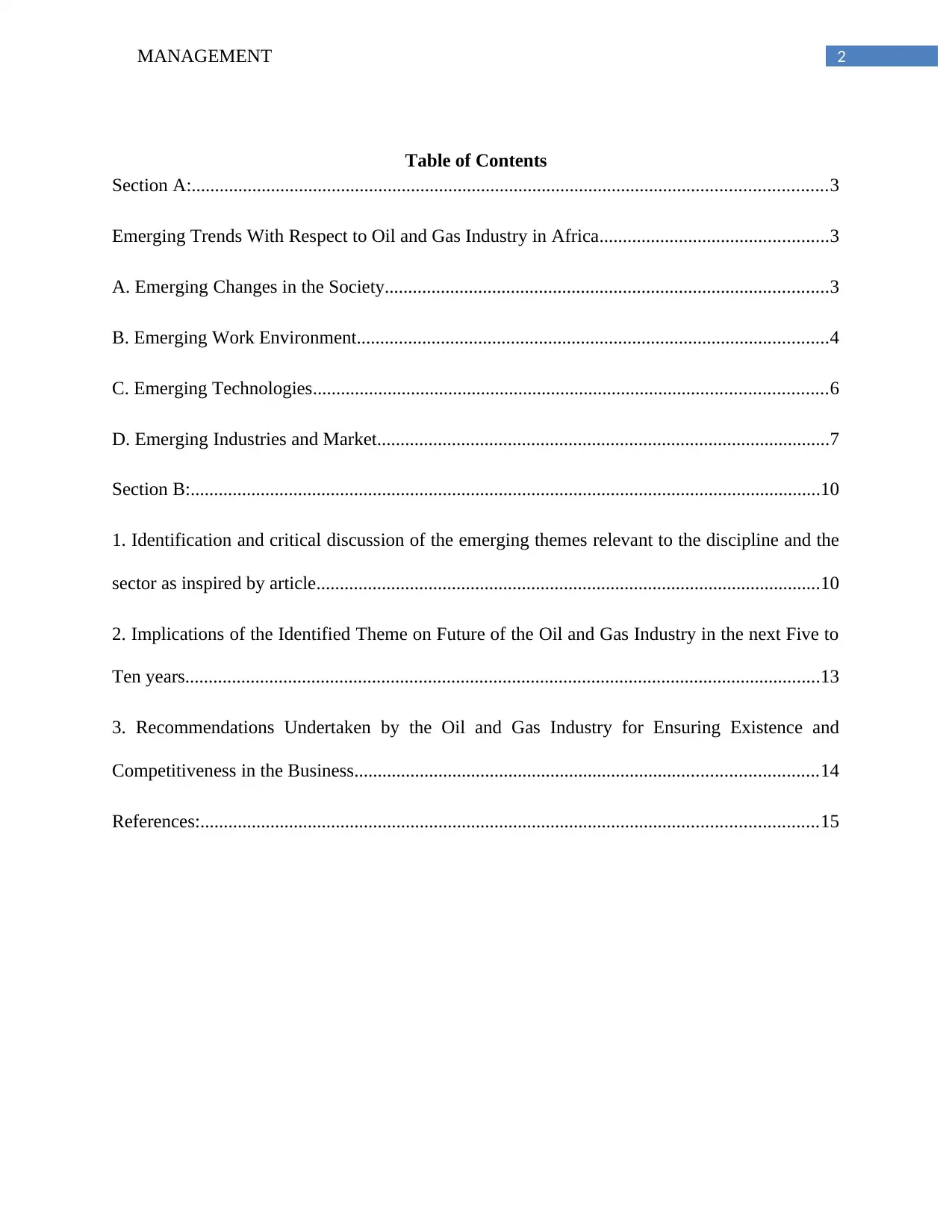
2MANAGEMENT
Table of Contents
Section A:........................................................................................................................................3
Emerging Trends With Respect to Oil and Gas Industry in Africa.................................................3
A. Emerging Changes in the Society...............................................................................................3
B. Emerging Work Environment.....................................................................................................4
C. Emerging Technologies..............................................................................................................6
D. Emerging Industries and Market.................................................................................................7
Section B:.......................................................................................................................................10
1. Identification and critical discussion of the emerging themes relevant to the discipline and the
sector as inspired by article............................................................................................................10
2. Implications of the Identified Theme on Future of the Oil and Gas Industry in the next Five to
Ten years........................................................................................................................................13
3. Recommendations Undertaken by the Oil and Gas Industry for Ensuring Existence and
Competitiveness in the Business...................................................................................................14
References:....................................................................................................................................15
Table of Contents
Section A:........................................................................................................................................3
Emerging Trends With Respect to Oil and Gas Industry in Africa.................................................3
A. Emerging Changes in the Society...............................................................................................3
B. Emerging Work Environment.....................................................................................................4
C. Emerging Technologies..............................................................................................................6
D. Emerging Industries and Market.................................................................................................7
Section B:.......................................................................................................................................10
1. Identification and critical discussion of the emerging themes relevant to the discipline and the
sector as inspired by article............................................................................................................10
2. Implications of the Identified Theme on Future of the Oil and Gas Industry in the next Five to
Ten years........................................................................................................................................13
3. Recommendations Undertaken by the Oil and Gas Industry for Ensuring Existence and
Competitiveness in the Business...................................................................................................14
References:....................................................................................................................................15
⊘ This is a preview!⊘
Do you want full access?
Subscribe today to unlock all pages.

Trusted by 1+ million students worldwide
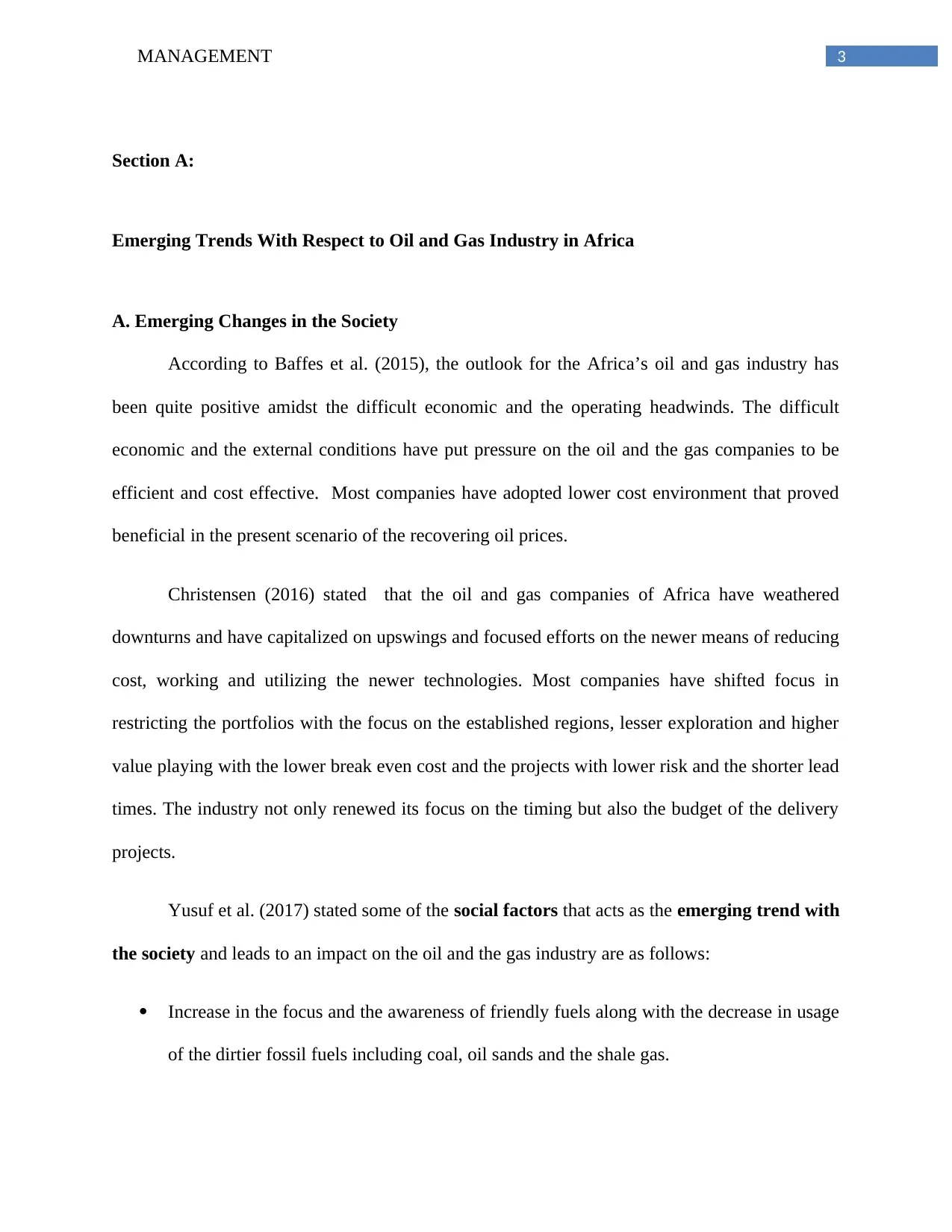
3MANAGEMENT
Section A:
Emerging Trends With Respect to Oil and Gas Industry in Africa
A. Emerging Changes in the Society
According to Baffes et al. (2015), the outlook for the Africa’s oil and gas industry has
been quite positive amidst the difficult economic and the operating headwinds. The difficult
economic and the external conditions have put pressure on the oil and the gas companies to be
efficient and cost effective. Most companies have adopted lower cost environment that proved
beneficial in the present scenario of the recovering oil prices.
Christensen (2016) stated that the oil and gas companies of Africa have weathered
downturns and have capitalized on upswings and focused efforts on the newer means of reducing
cost, working and utilizing the newer technologies. Most companies have shifted focus in
restricting the portfolios with the focus on the established regions, lesser exploration and higher
value playing with the lower break even cost and the projects with lower risk and the shorter lead
times. The industry not only renewed its focus on the timing but also the budget of the delivery
projects.
Yusuf et al. (2017) stated some of the social factors that acts as the emerging trend with
the society and leads to an impact on the oil and the gas industry are as follows:
Increase in the focus and the awareness of friendly fuels along with the decrease in usage
of the dirtier fossil fuels including coal, oil sands and the shale gas.
Section A:
Emerging Trends With Respect to Oil and Gas Industry in Africa
A. Emerging Changes in the Society
According to Baffes et al. (2015), the outlook for the Africa’s oil and gas industry has
been quite positive amidst the difficult economic and the operating headwinds. The difficult
economic and the external conditions have put pressure on the oil and the gas companies to be
efficient and cost effective. Most companies have adopted lower cost environment that proved
beneficial in the present scenario of the recovering oil prices.
Christensen (2016) stated that the oil and gas companies of Africa have weathered
downturns and have capitalized on upswings and focused efforts on the newer means of reducing
cost, working and utilizing the newer technologies. Most companies have shifted focus in
restricting the portfolios with the focus on the established regions, lesser exploration and higher
value playing with the lower break even cost and the projects with lower risk and the shorter lead
times. The industry not only renewed its focus on the timing but also the budget of the delivery
projects.
Yusuf et al. (2017) stated some of the social factors that acts as the emerging trend with
the society and leads to an impact on the oil and the gas industry are as follows:
Increase in the focus and the awareness of friendly fuels along with the decrease in usage
of the dirtier fossil fuels including coal, oil sands and the shale gas.
Paraphrase This Document
Need a fresh take? Get an instant paraphrase of this document with our AI Paraphraser
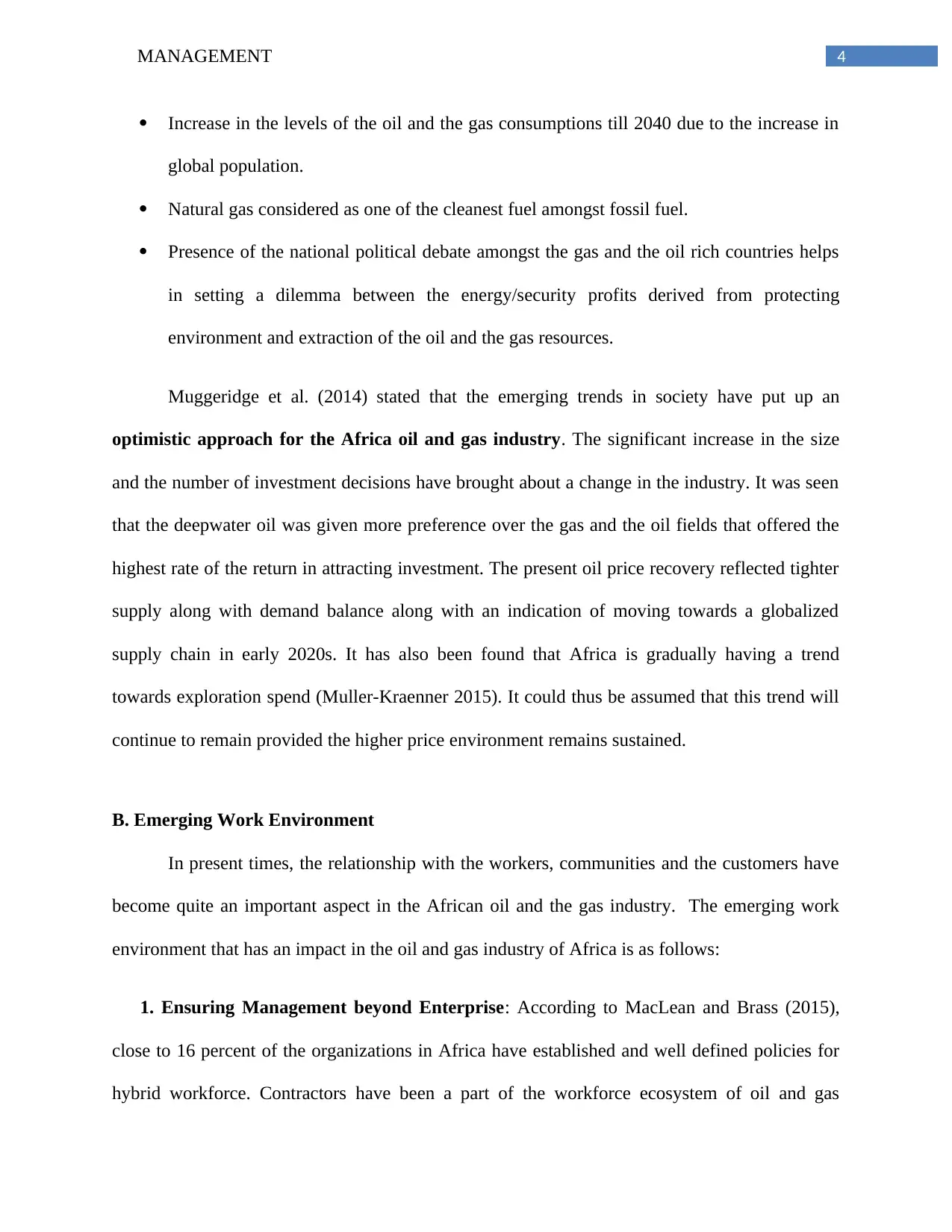
4MANAGEMENT
Increase in the levels of the oil and the gas consumptions till 2040 due to the increase in
global population.
Natural gas considered as one of the cleanest fuel amongst fossil fuel.
Presence of the national political debate amongst the gas and the oil rich countries helps
in setting a dilemma between the energy/security profits derived from protecting
environment and extraction of the oil and the gas resources.
Muggeridge et al. (2014) stated that the emerging trends in society have put up an
optimistic approach for the Africa oil and gas industry. The significant increase in the size
and the number of investment decisions have brought about a change in the industry. It was seen
that the deepwater oil was given more preference over the gas and the oil fields that offered the
highest rate of the return in attracting investment. The present oil price recovery reflected tighter
supply along with demand balance along with an indication of moving towards a globalized
supply chain in early 2020s. It has also been found that Africa is gradually having a trend
towards exploration spend (Muller-Kraenner 2015). It could thus be assumed that this trend will
continue to remain provided the higher price environment remains sustained.
B. Emerging Work Environment
In present times, the relationship with the workers, communities and the customers have
become quite an important aspect in the African oil and the gas industry. The emerging work
environment that has an impact in the oil and gas industry of Africa is as follows:
1. Ensuring Management beyond Enterprise: According to MacLean and Brass (2015),
close to 16 percent of the organizations in Africa have established and well defined policies for
hybrid workforce. Contractors have been a part of the workforce ecosystem of oil and gas
Increase in the levels of the oil and the gas consumptions till 2040 due to the increase in
global population.
Natural gas considered as one of the cleanest fuel amongst fossil fuel.
Presence of the national political debate amongst the gas and the oil rich countries helps
in setting a dilemma between the energy/security profits derived from protecting
environment and extraction of the oil and the gas resources.
Muggeridge et al. (2014) stated that the emerging trends in society have put up an
optimistic approach for the Africa oil and gas industry. The significant increase in the size
and the number of investment decisions have brought about a change in the industry. It was seen
that the deepwater oil was given more preference over the gas and the oil fields that offered the
highest rate of the return in attracting investment. The present oil price recovery reflected tighter
supply along with demand balance along with an indication of moving towards a globalized
supply chain in early 2020s. It has also been found that Africa is gradually having a trend
towards exploration spend (Muller-Kraenner 2015). It could thus be assumed that this trend will
continue to remain provided the higher price environment remains sustained.
B. Emerging Work Environment
In present times, the relationship with the workers, communities and the customers have
become quite an important aspect in the African oil and the gas industry. The emerging work
environment that has an impact in the oil and gas industry of Africa is as follows:
1. Ensuring Management beyond Enterprise: According to MacLean and Brass (2015),
close to 16 percent of the organizations in Africa have established and well defined policies for
hybrid workforce. Contractors have been a part of the workforce ecosystem of oil and gas
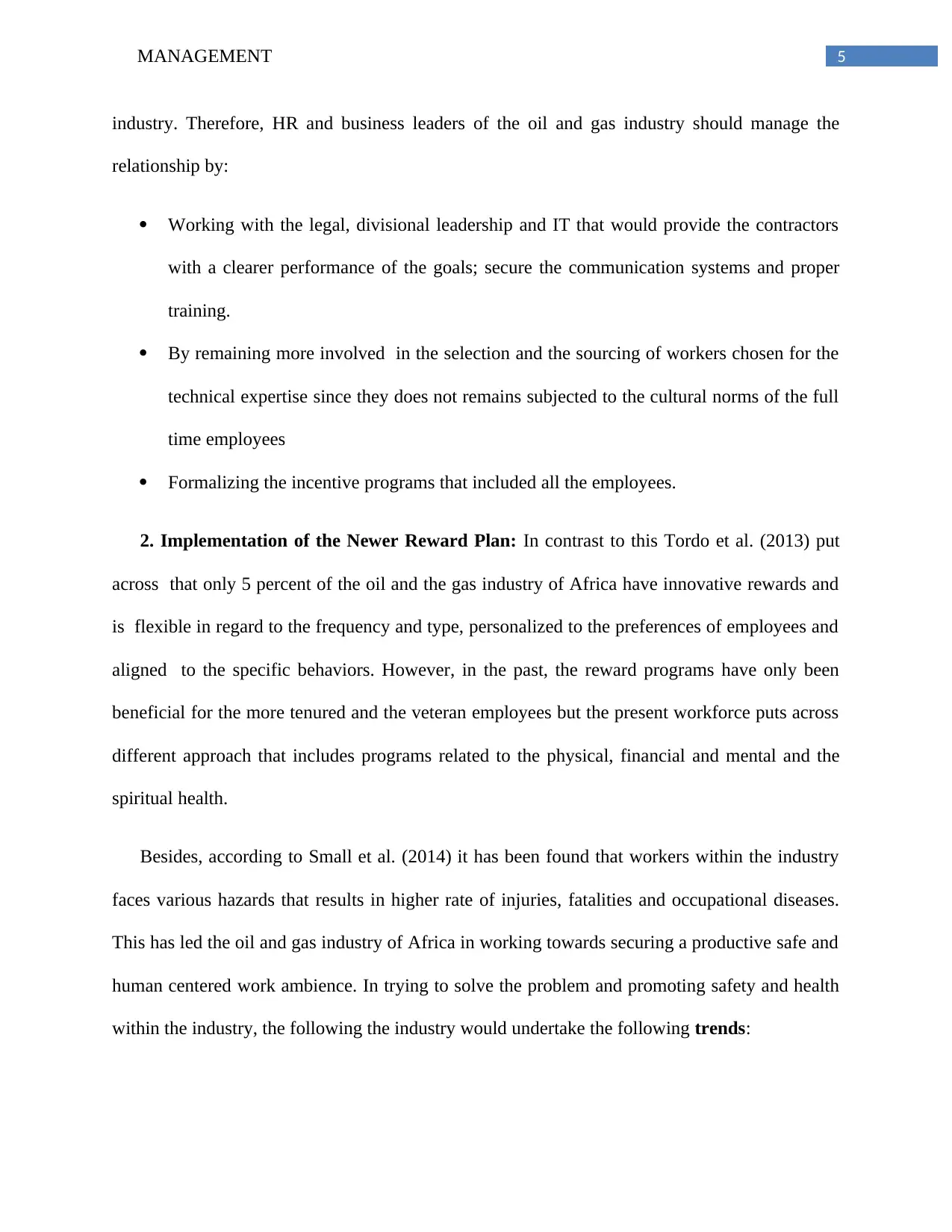
5MANAGEMENT
industry. Therefore, HR and business leaders of the oil and gas industry should manage the
relationship by:
Working with the legal, divisional leadership and IT that would provide the contractors
with a clearer performance of the goals; secure the communication systems and proper
training.
By remaining more involved in the selection and the sourcing of workers chosen for the
technical expertise since they does not remains subjected to the cultural norms of the full
time employees
Formalizing the incentive programs that included all the employees.
2. Implementation of the Newer Reward Plan: In contrast to this Tordo et al. (2013) put
across that only 5 percent of the oil and the gas industry of Africa have innovative rewards and
is flexible in regard to the frequency and type, personalized to the preferences of employees and
aligned to the specific behaviors. However, in the past, the reward programs have only been
beneficial for the more tenured and the veteran employees but the present workforce puts across
different approach that includes programs related to the physical, financial and mental and the
spiritual health.
Besides, according to Small et al. (2014) it has been found that workers within the industry
faces various hazards that results in higher rate of injuries, fatalities and occupational diseases.
This has led the oil and gas industry of Africa in working towards securing a productive safe and
human centered work ambience. In trying to solve the problem and promoting safety and health
within the industry, the following the industry would undertake the following trends:
industry. Therefore, HR and business leaders of the oil and gas industry should manage the
relationship by:
Working with the legal, divisional leadership and IT that would provide the contractors
with a clearer performance of the goals; secure the communication systems and proper
training.
By remaining more involved in the selection and the sourcing of workers chosen for the
technical expertise since they does not remains subjected to the cultural norms of the full
time employees
Formalizing the incentive programs that included all the employees.
2. Implementation of the Newer Reward Plan: In contrast to this Tordo et al. (2013) put
across that only 5 percent of the oil and the gas industry of Africa have innovative rewards and
is flexible in regard to the frequency and type, personalized to the preferences of employees and
aligned to the specific behaviors. However, in the past, the reward programs have only been
beneficial for the more tenured and the veteran employees but the present workforce puts across
different approach that includes programs related to the physical, financial and mental and the
spiritual health.
Besides, according to Small et al. (2014) it has been found that workers within the industry
faces various hazards that results in higher rate of injuries, fatalities and occupational diseases.
This has led the oil and gas industry of Africa in working towards securing a productive safe and
human centered work ambience. In trying to solve the problem and promoting safety and health
within the industry, the following the industry would undertake the following trends:
⊘ This is a preview!⊘
Do you want full access?
Subscribe today to unlock all pages.

Trusted by 1+ million students worldwide
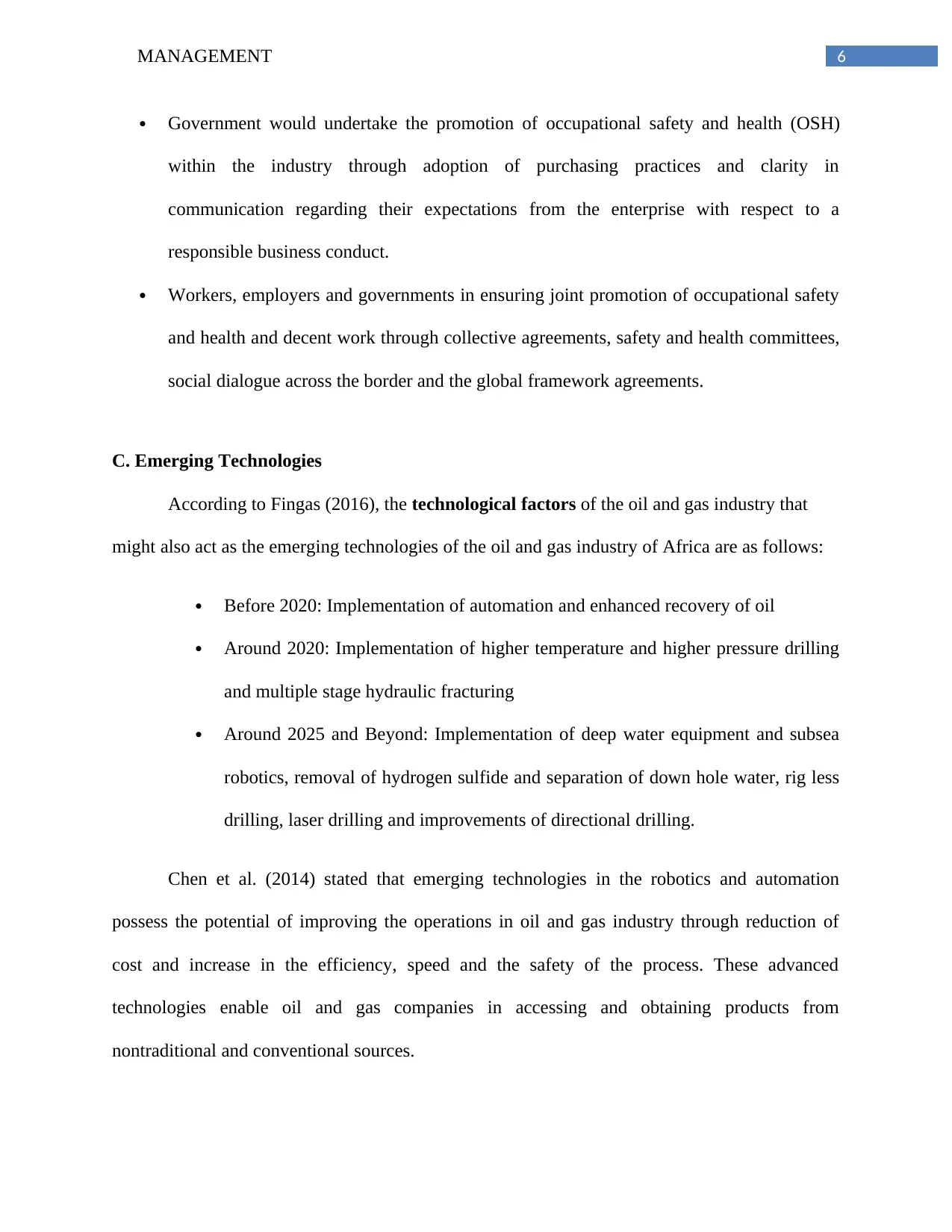
6MANAGEMENT
Government would undertake the promotion of occupational safety and health (OSH)
within the industry through adoption of purchasing practices and clarity in
communication regarding their expectations from the enterprise with respect to a
responsible business conduct.
Workers, employers and governments in ensuring joint promotion of occupational safety
and health and decent work through collective agreements, safety and health committees,
social dialogue across the border and the global framework agreements.
C. Emerging Technologies
According to Fingas (2016), the technological factors of the oil and gas industry that
might also act as the emerging technologies of the oil and gas industry of Africa are as follows:
Before 2020: Implementation of automation and enhanced recovery of oil
Around 2020: Implementation of higher temperature and higher pressure drilling
and multiple stage hydraulic fracturing
Around 2025 and Beyond: Implementation of deep water equipment and subsea
robotics, removal of hydrogen sulfide and separation of down hole water, rig less
drilling, laser drilling and improvements of directional drilling.
Chen et al. (2014) stated that emerging technologies in the robotics and automation
possess the potential of improving the operations in oil and gas industry through reduction of
cost and increase in the efficiency, speed and the safety of the process. These advanced
technologies enable oil and gas companies in accessing and obtaining products from
nontraditional and conventional sources.
Government would undertake the promotion of occupational safety and health (OSH)
within the industry through adoption of purchasing practices and clarity in
communication regarding their expectations from the enterprise with respect to a
responsible business conduct.
Workers, employers and governments in ensuring joint promotion of occupational safety
and health and decent work through collective agreements, safety and health committees,
social dialogue across the border and the global framework agreements.
C. Emerging Technologies
According to Fingas (2016), the technological factors of the oil and gas industry that
might also act as the emerging technologies of the oil and gas industry of Africa are as follows:
Before 2020: Implementation of automation and enhanced recovery of oil
Around 2020: Implementation of higher temperature and higher pressure drilling
and multiple stage hydraulic fracturing
Around 2025 and Beyond: Implementation of deep water equipment and subsea
robotics, removal of hydrogen sulfide and separation of down hole water, rig less
drilling, laser drilling and improvements of directional drilling.
Chen et al. (2014) stated that emerging technologies in the robotics and automation
possess the potential of improving the operations in oil and gas industry through reduction of
cost and increase in the efficiency, speed and the safety of the process. These advanced
technologies enable oil and gas companies in accessing and obtaining products from
nontraditional and conventional sources.
Paraphrase This Document
Need a fresh take? Get an instant paraphrase of this document with our AI Paraphraser
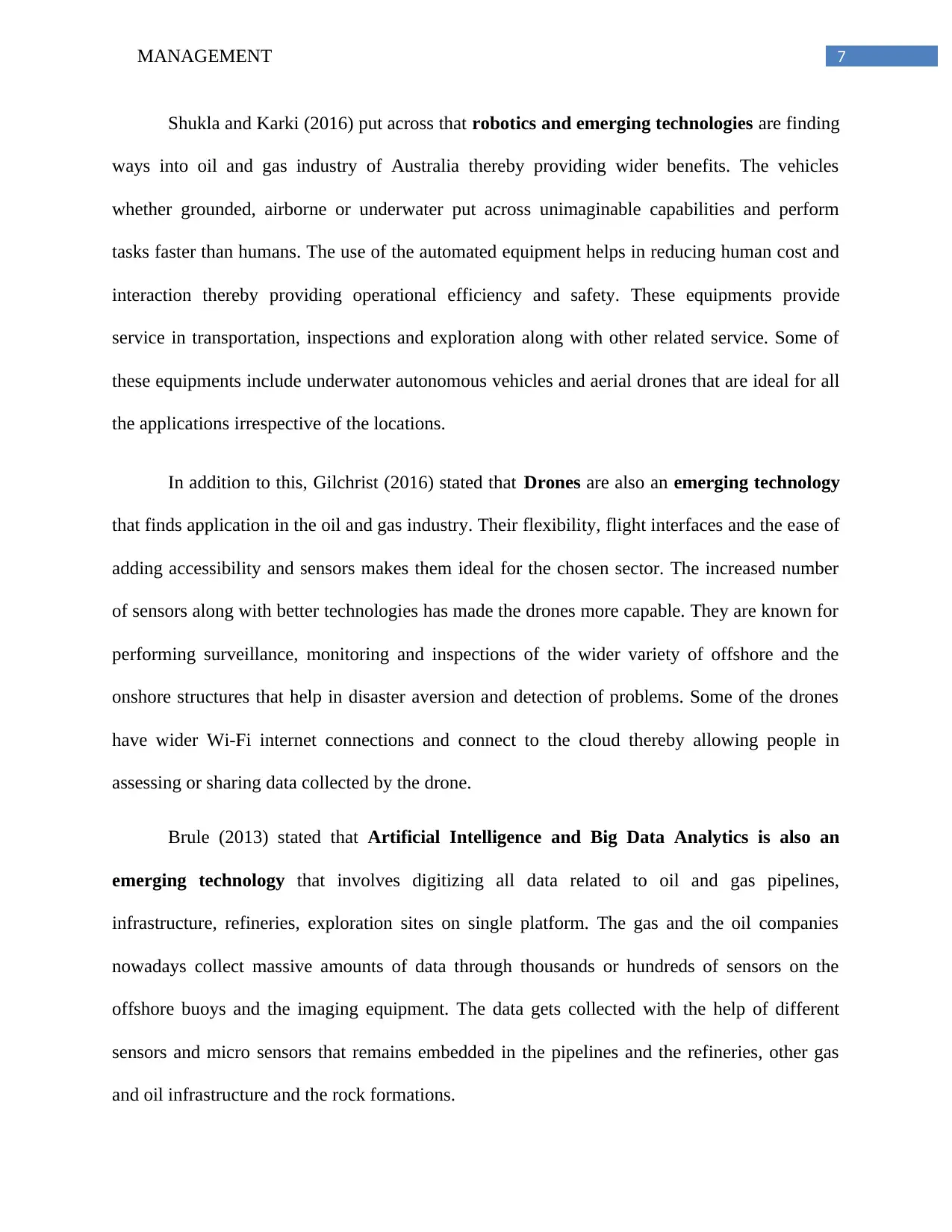
7MANAGEMENT
Shukla and Karki (2016) put across that robotics and emerging technologies are finding
ways into oil and gas industry of Australia thereby providing wider benefits. The vehicles
whether grounded, airborne or underwater put across unimaginable capabilities and perform
tasks faster than humans. The use of the automated equipment helps in reducing human cost and
interaction thereby providing operational efficiency and safety. These equipments provide
service in transportation, inspections and exploration along with other related service. Some of
these equipments include underwater autonomous vehicles and aerial drones that are ideal for all
the applications irrespective of the locations.
In addition to this, Gilchrist (2016) stated that Drones are also an emerging technology
that finds application in the oil and gas industry. Their flexibility, flight interfaces and the ease of
adding accessibility and sensors makes them ideal for the chosen sector. The increased number
of sensors along with better technologies has made the drones more capable. They are known for
performing surveillance, monitoring and inspections of the wider variety of offshore and the
onshore structures that help in disaster aversion and detection of problems. Some of the drones
have wider Wi-Fi internet connections and connect to the cloud thereby allowing people in
assessing or sharing data collected by the drone.
Brule (2013) stated that Artificial Intelligence and Big Data Analytics is also an
emerging technology that involves digitizing all data related to oil and gas pipelines,
infrastructure, refineries, exploration sites on single platform. The gas and the oil companies
nowadays collect massive amounts of data through thousands or hundreds of sensors on the
offshore buoys and the imaging equipment. The data gets collected with the help of different
sensors and micro sensors that remains embedded in the pipelines and the refineries, other gas
and oil infrastructure and the rock formations.
Shukla and Karki (2016) put across that robotics and emerging technologies are finding
ways into oil and gas industry of Australia thereby providing wider benefits. The vehicles
whether grounded, airborne or underwater put across unimaginable capabilities and perform
tasks faster than humans. The use of the automated equipment helps in reducing human cost and
interaction thereby providing operational efficiency and safety. These equipments provide
service in transportation, inspections and exploration along with other related service. Some of
these equipments include underwater autonomous vehicles and aerial drones that are ideal for all
the applications irrespective of the locations.
In addition to this, Gilchrist (2016) stated that Drones are also an emerging technology
that finds application in the oil and gas industry. Their flexibility, flight interfaces and the ease of
adding accessibility and sensors makes them ideal for the chosen sector. The increased number
of sensors along with better technologies has made the drones more capable. They are known for
performing surveillance, monitoring and inspections of the wider variety of offshore and the
onshore structures that help in disaster aversion and detection of problems. Some of the drones
have wider Wi-Fi internet connections and connect to the cloud thereby allowing people in
assessing or sharing data collected by the drone.
Brule (2013) stated that Artificial Intelligence and Big Data Analytics is also an
emerging technology that involves digitizing all data related to oil and gas pipelines,
infrastructure, refineries, exploration sites on single platform. The gas and the oil companies
nowadays collect massive amounts of data through thousands or hundreds of sensors on the
offshore buoys and the imaging equipment. The data gets collected with the help of different
sensors and micro sensors that remains embedded in the pipelines and the refineries, other gas
and oil infrastructure and the rock formations.
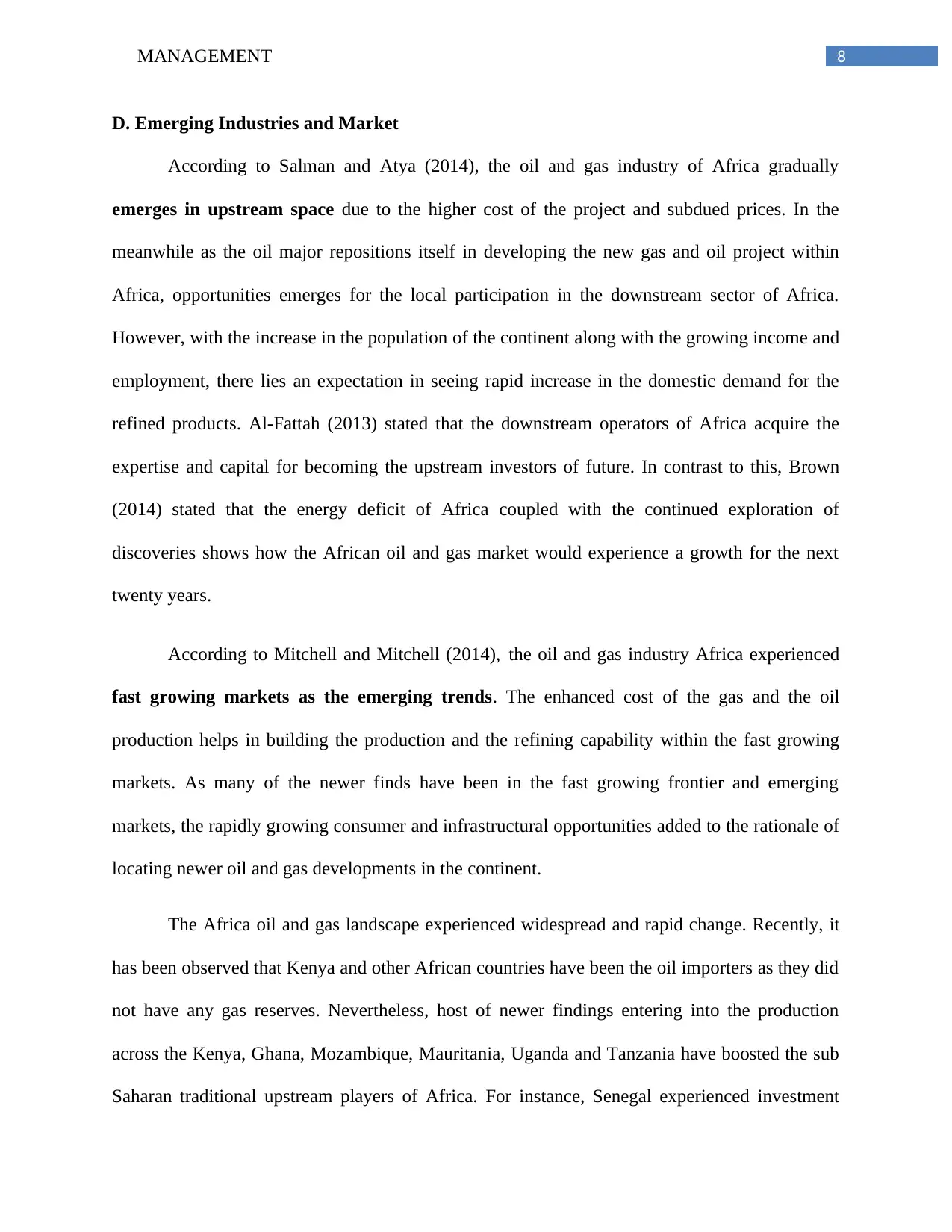
8MANAGEMENT
D. Emerging Industries and Market
According to Salman and Atya (2014), the oil and gas industry of Africa gradually
emerges in upstream space due to the higher cost of the project and subdued prices. In the
meanwhile as the oil major repositions itself in developing the new gas and oil project within
Africa, opportunities emerges for the local participation in the downstream sector of Africa.
However, with the increase in the population of the continent along with the growing income and
employment, there lies an expectation in seeing rapid increase in the domestic demand for the
refined products. Al-Fattah (2013) stated that the downstream operators of Africa acquire the
expertise and capital for becoming the upstream investors of future. In contrast to this, Brown
(2014) stated that the energy deficit of Africa coupled with the continued exploration of
discoveries shows how the African oil and gas market would experience a growth for the next
twenty years.
According to Mitchell and Mitchell (2014), the oil and gas industry Africa experienced
fast growing markets as the emerging trends. The enhanced cost of the gas and the oil
production helps in building the production and the refining capability within the fast growing
markets. As many of the newer finds have been in the fast growing frontier and emerging
markets, the rapidly growing consumer and infrastructural opportunities added to the rationale of
locating newer oil and gas developments in the continent.
The Africa oil and gas landscape experienced widespread and rapid change. Recently, it
has been observed that Kenya and other African countries have been the oil importers as they did
not have any gas reserves. Nevertheless, host of newer findings entering into the production
across the Kenya, Ghana, Mozambique, Mauritania, Uganda and Tanzania have boosted the sub
Saharan traditional upstream players of Africa. For instance, Senegal experienced investment
D. Emerging Industries and Market
According to Salman and Atya (2014), the oil and gas industry of Africa gradually
emerges in upstream space due to the higher cost of the project and subdued prices. In the
meanwhile as the oil major repositions itself in developing the new gas and oil project within
Africa, opportunities emerges for the local participation in the downstream sector of Africa.
However, with the increase in the population of the continent along with the growing income and
employment, there lies an expectation in seeing rapid increase in the domestic demand for the
refined products. Al-Fattah (2013) stated that the downstream operators of Africa acquire the
expertise and capital for becoming the upstream investors of future. In contrast to this, Brown
(2014) stated that the energy deficit of Africa coupled with the continued exploration of
discoveries shows how the African oil and gas market would experience a growth for the next
twenty years.
According to Mitchell and Mitchell (2014), the oil and gas industry Africa experienced
fast growing markets as the emerging trends. The enhanced cost of the gas and the oil
production helps in building the production and the refining capability within the fast growing
markets. As many of the newer finds have been in the fast growing frontier and emerging
markets, the rapidly growing consumer and infrastructural opportunities added to the rationale of
locating newer oil and gas developments in the continent.
The Africa oil and gas landscape experienced widespread and rapid change. Recently, it
has been observed that Kenya and other African countries have been the oil importers as they did
not have any gas reserves. Nevertheless, host of newer findings entering into the production
across the Kenya, Ghana, Mozambique, Mauritania, Uganda and Tanzania have boosted the sub
Saharan traditional upstream players of Africa. For instance, Senegal experienced investment
⊘ This is a preview!⊘
Do you want full access?
Subscribe today to unlock all pages.

Trusted by 1+ million students worldwide
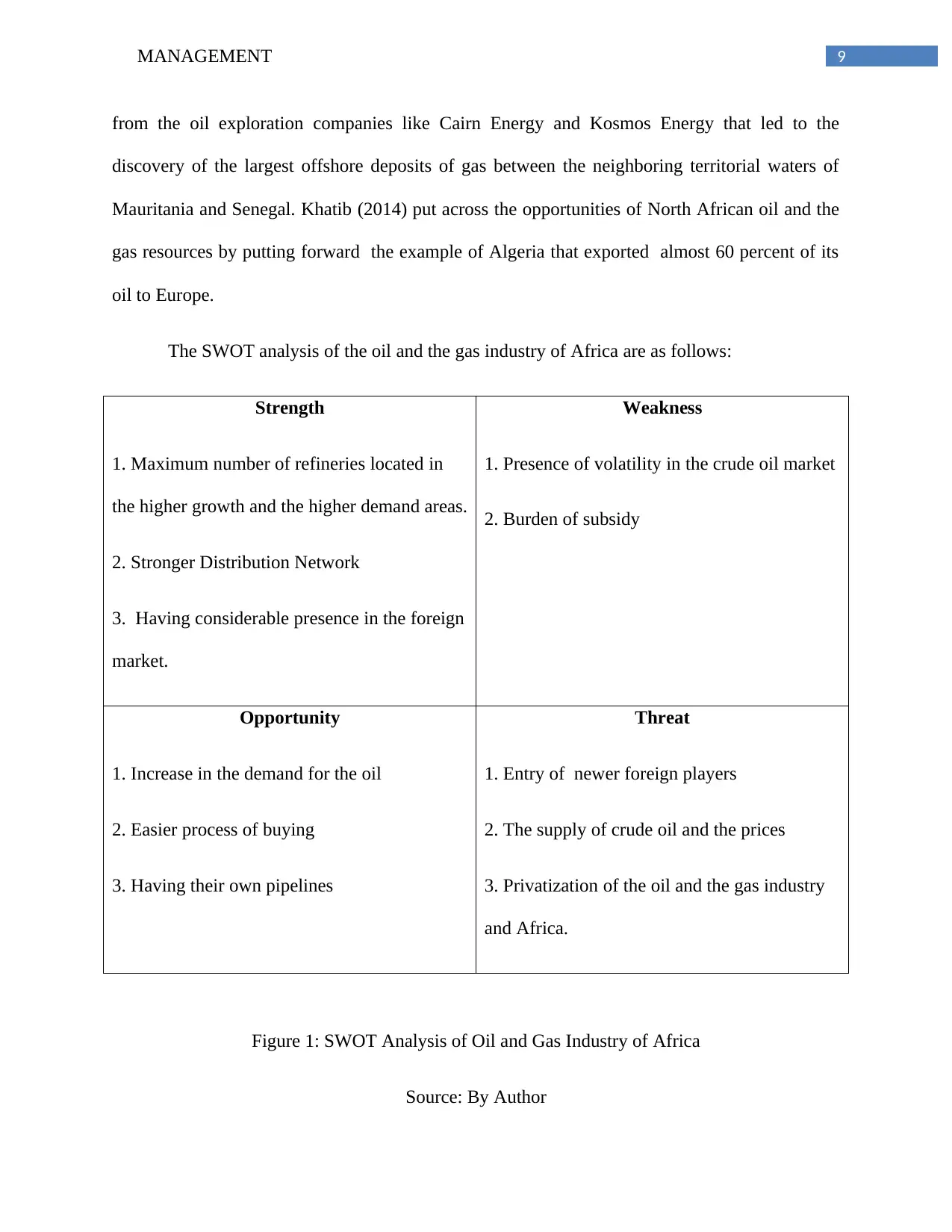
9MANAGEMENT
from the oil exploration companies like Cairn Energy and Kosmos Energy that led to the
discovery of the largest offshore deposits of gas between the neighboring territorial waters of
Mauritania and Senegal. Khatib (2014) put across the opportunities of North African oil and the
gas resources by putting forward the example of Algeria that exported almost 60 percent of its
oil to Europe.
The SWOT analysis of the oil and the gas industry of Africa are as follows:
Strength
1. Maximum number of refineries located in
the higher growth and the higher demand areas.
2. Stronger Distribution Network
3. Having considerable presence in the foreign
market.
Weakness
1. Presence of volatility in the crude oil market
2. Burden of subsidy
Opportunity
1. Increase in the demand for the oil
2. Easier process of buying
3. Having their own pipelines
Threat
1. Entry of newer foreign players
2. The supply of crude oil and the prices
3. Privatization of the oil and the gas industry
and Africa.
Figure 1: SWOT Analysis of Oil and Gas Industry of Africa
Source: By Author
from the oil exploration companies like Cairn Energy and Kosmos Energy that led to the
discovery of the largest offshore deposits of gas between the neighboring territorial waters of
Mauritania and Senegal. Khatib (2014) put across the opportunities of North African oil and the
gas resources by putting forward the example of Algeria that exported almost 60 percent of its
oil to Europe.
The SWOT analysis of the oil and the gas industry of Africa are as follows:
Strength
1. Maximum number of refineries located in
the higher growth and the higher demand areas.
2. Stronger Distribution Network
3. Having considerable presence in the foreign
market.
Weakness
1. Presence of volatility in the crude oil market
2. Burden of subsidy
Opportunity
1. Increase in the demand for the oil
2. Easier process of buying
3. Having their own pipelines
Threat
1. Entry of newer foreign players
2. The supply of crude oil and the prices
3. Privatization of the oil and the gas industry
and Africa.
Figure 1: SWOT Analysis of Oil and Gas Industry of Africa
Source: By Author
Paraphrase This Document
Need a fresh take? Get an instant paraphrase of this document with our AI Paraphraser
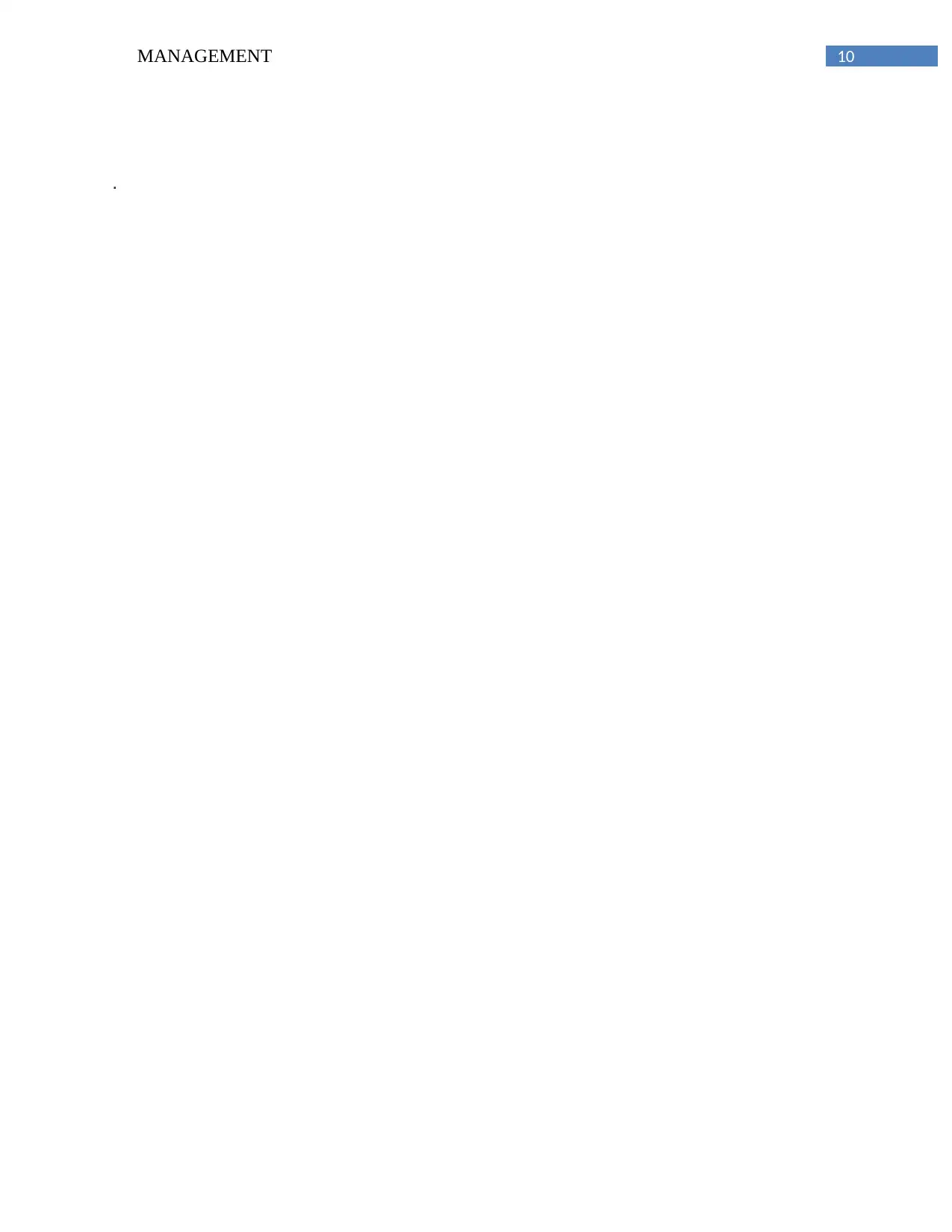
10MANAGEMENT
.
.
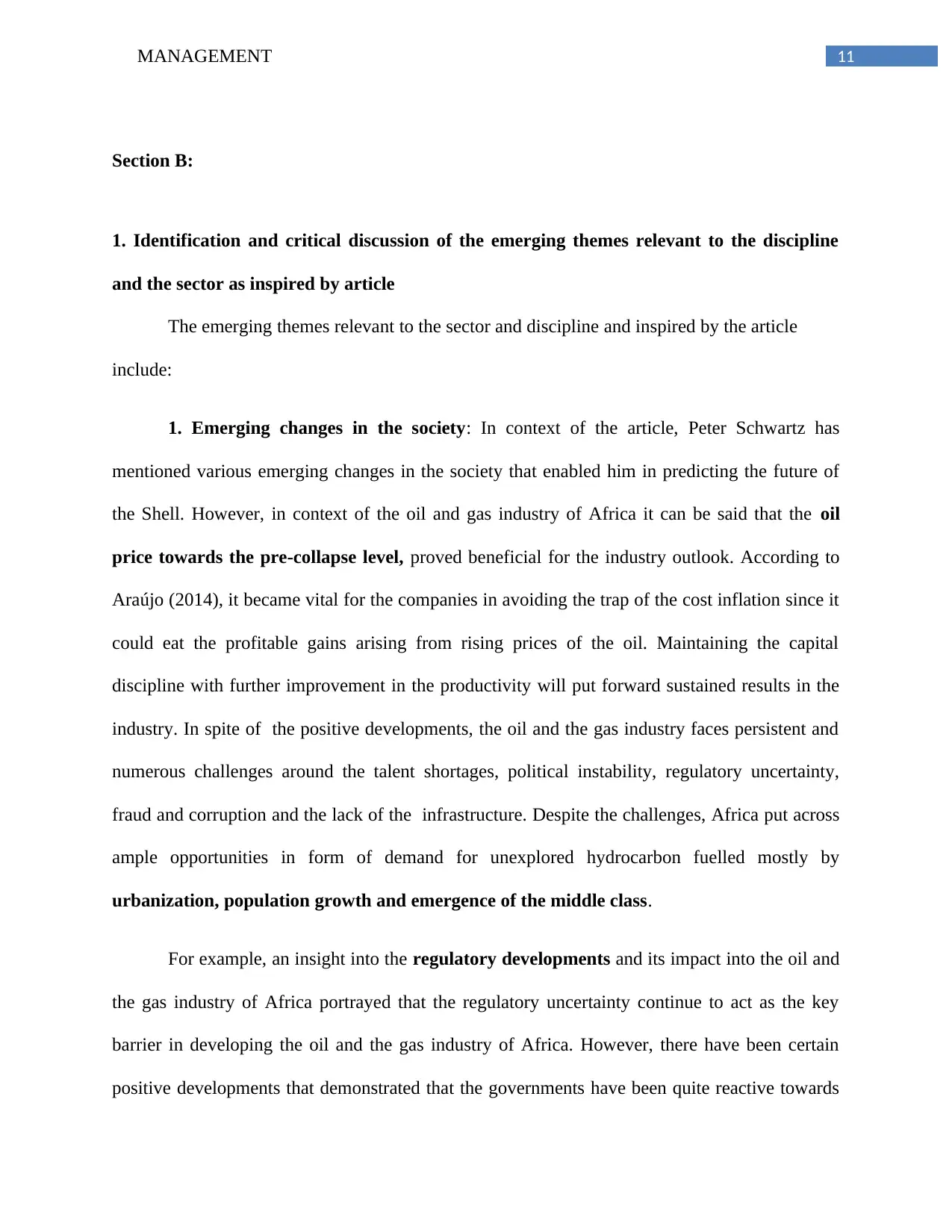
11MANAGEMENT
Section B:
1. Identification and critical discussion of the emerging themes relevant to the discipline
and the sector as inspired by article
The emerging themes relevant to the sector and discipline and inspired by the article
include:
1. Emerging changes in the society: In context of the article, Peter Schwartz has
mentioned various emerging changes in the society that enabled him in predicting the future of
the Shell. However, in context of the oil and gas industry of Africa it can be said that the oil
price towards the pre-collapse level, proved beneficial for the industry outlook. According to
Araújo (2014), it became vital for the companies in avoiding the trap of the cost inflation since it
could eat the profitable gains arising from rising prices of the oil. Maintaining the capital
discipline with further improvement in the productivity will put forward sustained results in the
industry. In spite of the positive developments, the oil and the gas industry faces persistent and
numerous challenges around the talent shortages, political instability, regulatory uncertainty,
fraud and corruption and the lack of the infrastructure. Despite the challenges, Africa put across
ample opportunities in form of demand for unexplored hydrocarbon fuelled mostly by
urbanization, population growth and emergence of the middle class.
For example, an insight into the regulatory developments and its impact into the oil and
the gas industry of Africa portrayed that the regulatory uncertainty continue to act as the key
barrier in developing the oil and the gas industry of Africa. However, there have been certain
positive developments that demonstrated that the governments have been quite reactive towards
Section B:
1. Identification and critical discussion of the emerging themes relevant to the discipline
and the sector as inspired by article
The emerging themes relevant to the sector and discipline and inspired by the article
include:
1. Emerging changes in the society: In context of the article, Peter Schwartz has
mentioned various emerging changes in the society that enabled him in predicting the future of
the Shell. However, in context of the oil and gas industry of Africa it can be said that the oil
price towards the pre-collapse level, proved beneficial for the industry outlook. According to
Araújo (2014), it became vital for the companies in avoiding the trap of the cost inflation since it
could eat the profitable gains arising from rising prices of the oil. Maintaining the capital
discipline with further improvement in the productivity will put forward sustained results in the
industry. In spite of the positive developments, the oil and the gas industry faces persistent and
numerous challenges around the talent shortages, political instability, regulatory uncertainty,
fraud and corruption and the lack of the infrastructure. Despite the challenges, Africa put across
ample opportunities in form of demand for unexplored hydrocarbon fuelled mostly by
urbanization, population growth and emergence of the middle class.
For example, an insight into the regulatory developments and its impact into the oil and
the gas industry of Africa portrayed that the regulatory uncertainty continue to act as the key
barrier in developing the oil and the gas industry of Africa. However, there have been certain
positive developments that demonstrated that the governments have been quite reactive towards
⊘ This is a preview!⊘
Do you want full access?
Subscribe today to unlock all pages.

Trusted by 1+ million students worldwide
1 out of 20
Related Documents
Your All-in-One AI-Powered Toolkit for Academic Success.
+13062052269
info@desklib.com
Available 24*7 on WhatsApp / Email
![[object Object]](/_next/static/media/star-bottom.7253800d.svg)
Unlock your academic potential
Copyright © 2020–2026 A2Z Services. All Rights Reserved. Developed and managed by ZUCOL.





